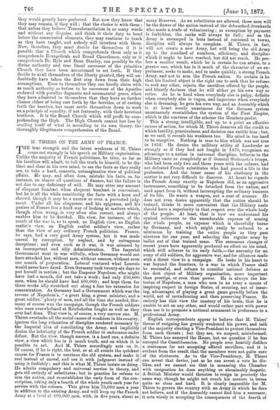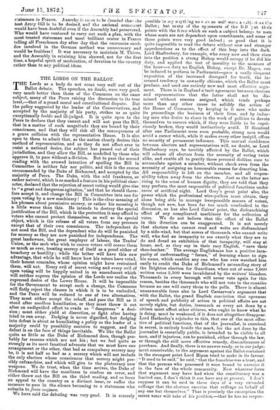M. TRIERS ON THE ARMY OF FRANCE.
THE true strength and the latent weakness of M. Thiers come out strongly in his speech on Military organisation. Unlike the majority of French politicians, he tries, so far as his faculties will admit, to tell the truth to himself, to be dis- tinct and clear in his own mind, to see the facts as they really are, to take a hard, concrete, unimaginative view of political affairs. He may, and often does, mistake his facts, as, for instance, on almost all questions of finance, but the failure is not due to any deficiency of will. He may utter any amount of eloquent bombast when eloquent bombast is convenient, but he is all the while considering the facts with a keen and shrewd, though it may be a narrow or even a perverted judg- ment. Under all his eloquence, and his epigrams, and his praises of France lies a hard way of looking at matters which, though often wrong, is very often also correct, and always enables him to be decided. His view, for instance, of the result of the war is, so to speak, an English view, an English realist's view, an English realist soldier's view, rather than the view of any ordinary French ,politician. France, he says, had a very good Army system, but it was made unreal by corruption, by neglect, and by outrageous deceptions ; and even such as it was, it was misused by an incompetent and silly Administration. The Imperial Government went to war wilfully, when Germany would not have attacked her, without men, without cannon, without even one month of preparation. Lebomf ventured what Lonvois would never have dared. Even Germany took twenty-six days to put herself in motion ; but the Emperor Napoleon, who might have had a month, did not take a week ; had only 250,000 men, when he should have had 400,000; and kept them for three weeks idly stretched out along a line too extensive for concentration. As Germany had a Government which was the reverse of Napoleon's, "a great king, a great minister, and a great soldier," plenty of men, and all the time she needed, Ger- many of course won the campaign, though the French soldiers who were overwhelmed at Reichshofen fought as well as they ever had done. That view is, of course, a very narrow one. M. Thiers overlooks all the social causes of weakness in his country, ignores the long relaxation of discipline rendered necessary by the Imperial idea of conciliating the Army, and implicitly denies the inferiority of the French soldier in endurance under defeat. But the view, though narrow, is a hard one, a definite view, a view which has in it much truth, and on which it is possible to act. And M. Thiers accordingly acts on it. Of course, if he is right, the best, or at all events the quickest course for France is to continue the old system, and make it real instead of unreal, and use it with judgment instead of using it foolishly ; and this is what M. Thiers insists on doing. He admits compulsory and universal service in theory, and gets rid entirely of substitutes; but in practice he refuses to arm the nation, and re-establishes the early form of the con- scription, taking only a fourth of the whole youth each year for service with the colours. This gives him 75,000 men a year in addition to the existing Army, and will keep up the French Army at a level of 400,000 men, with, in five years, about as
many Reserves. As no substitutes are allowed, these men will be the flower of the nation instead of the debauched drunkards who made a trade of volunteering ; as exemption by payment is forbidden, the ranks will always be full; and as the Army is encamped in huts instead of cantoned in towns, discipline will always be complete. M. Thiers, in fact, will not create a new Army, but will bring the old Army up to the standard of numbers, efficiency, and discipline which it ought to have reached, but did not reach. He pre- fers a smaller result, which he is certain he can attain, to a greater one, which has in it much of the character of an ex- periment, seeks to make, and to make quickly, a strong French Army, and not to arm the French nation. So certain is he that his limited object is the right one to seek that he refuses to seek any other, rejects the sacrifices offered by the people, and bluntly declares that he will either go his own way or retire. As he is hard when everybody else is pulpy, definite when everybody else is vague, and imperious when everybody else is dreaming, he gets his own way, and an Assembly which is at heart nearly unanimous for the German system unanimously reestablishes the system of the First Empire, which is the converse of the scheme the Members prefer.
This a strong, intelligible, and up to a point an effective course of action, for which M. Thiers deserves all the credit to which lucidity, practicalness, and decision can entitle him ; but, as we said, it reveals his weakness too. His mind is too hard to be receptive. Nothing is true to him which was not true in 1832. He denies the military utility of Landwehr as strongly as if they had not fought in 1870, recognises no advantage to a.nation in universal discipline, believes in the Military caste as completely as if General Steinmetz's troops, who had been only two and three years with the colours, had not defeated French substitutes who had passed a life in the profession. And the inner cause of his obstinacy in the matter is not very difficult to discover. At heart he regards the French Army exactly as Napoleon did, as an aggressive instrument, something to be detached from the nation, and used apart from it, without interrupting the ordinary business of its life. He wants a weapon, not a coat of armour. He does not even desire apparently that the nation should be trained, thinks it more convenient that the Military caste should have a superiority in that respect over the whole body of the people. At least, that is bow we understand his cynical reference to the unendurable expense of arming the whole people, an expense which is cheerfully borne by Germany, and which might easily be reduced to a minimum by training the entire people as they pass nineteen for one year, and selecting the regular army by ballot out of that trained mass. The enormous changes of recent years have apparently produced no effect on his mind, which still adheres to its early faith,—the necessity for an army of old soldiers, for aggressive war, and for alliances made with a direct view to a campaign. He looks in his heart to war beyond the frontiers, to a war in which France shall be successful, and refuses to consider national defence as the first object of Military organisation, more important than prestige, or even than power. He is always the his- torian of Napoleon, a man who sees in an army a means of inspiring respect in foreign States, of securing, not of insur- ing, advantages, of playing a great game grandly before the world, not of revindicating and then preserving France. So entirely has this view the mastery of his brain, that he is unable to act on any other, and would rather part with power than use it to promote a national armament in preference to a professional Army. English correspondents appear to believe that M. Thiers' threat of resigning has greatly weakened his power, and talk of the majority electing a Vice-President to protect themselves from such threats ; but they are, we suspect, misinformed. M. Thiers has annoyed the House, but we question if he has annoyed the Constituencies. No people ever heartily dislikes a statesman for not accepting offered sacrifices, and it is evident from the result that the members were not quite sure of the electorate. As to the Vice-Presidency, M. Thiers can arrest that device, just as he can arrest a vote he dis- likes, and we cannot see that in menacing the Chamber with resignation he does anything so abominably despotic. A British Minister would threaten to resign in precisely the same way, though he might not couch his menace in terms quite so clear and hard. It is clearly impossible for M. Thiers to govern the country with an Army in which he does not believe, and if the Assembly cannot find him a successor, it acts wisely in accepting the consequences of the dearth of etatesmen in France. Anarchy nacre to be dreaded than dee best Arrey Bill is to be desired, and the national armaruent would have been doubtful even if the Assembly had persevered. Who would have ventured to carry out such a plan, with the most trusted statesman and most brilliant orator in France telling all Frenchmen day after day that the enormous sacri- fice involved in the German method was unnecessary and would be fruitless ? It was necessary to maintain M. Thiers, and the Assembly in retaining him showed, not for the first time, a hopeful spirit of moderation, of devotion to the country rather than to any political ideas.



































 Previous page
Previous page